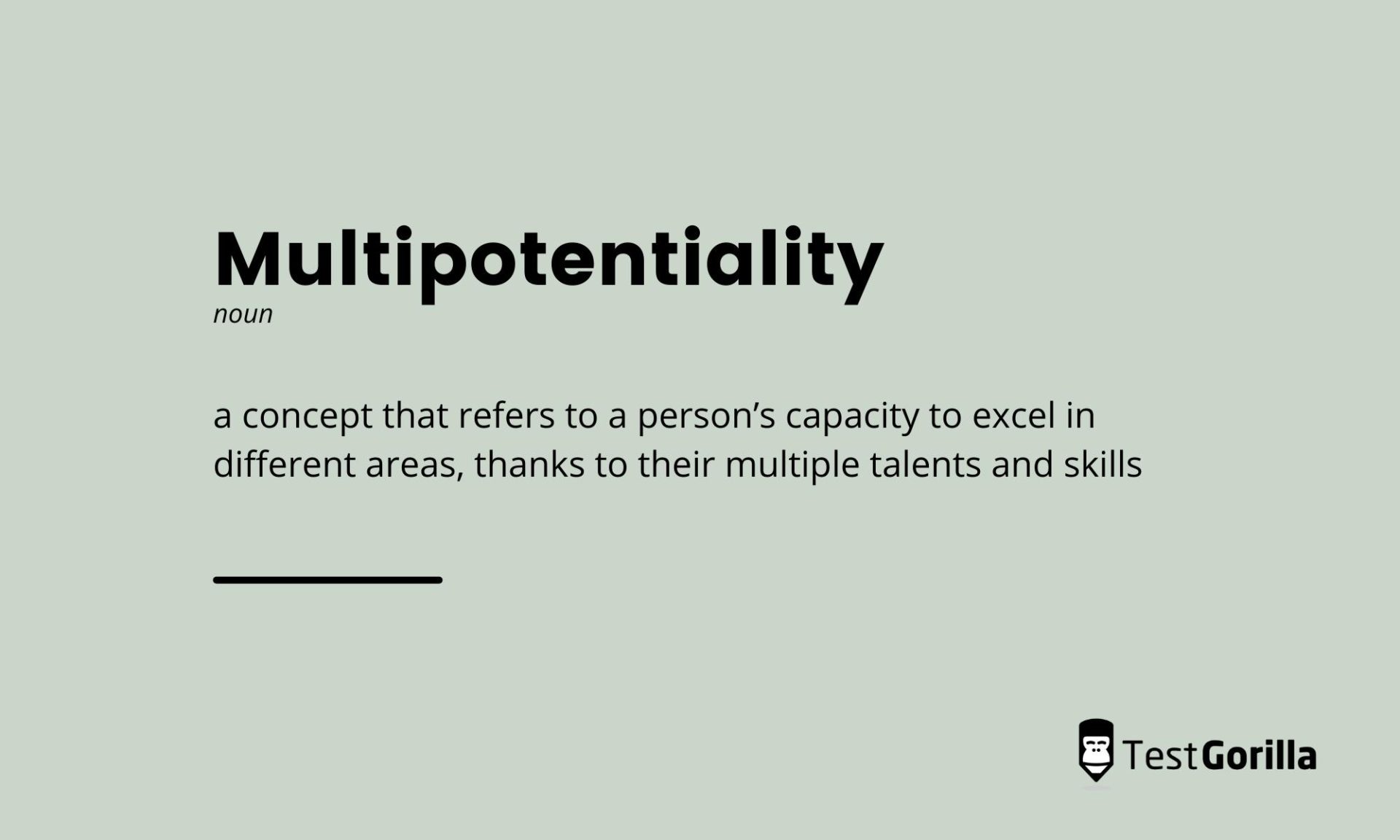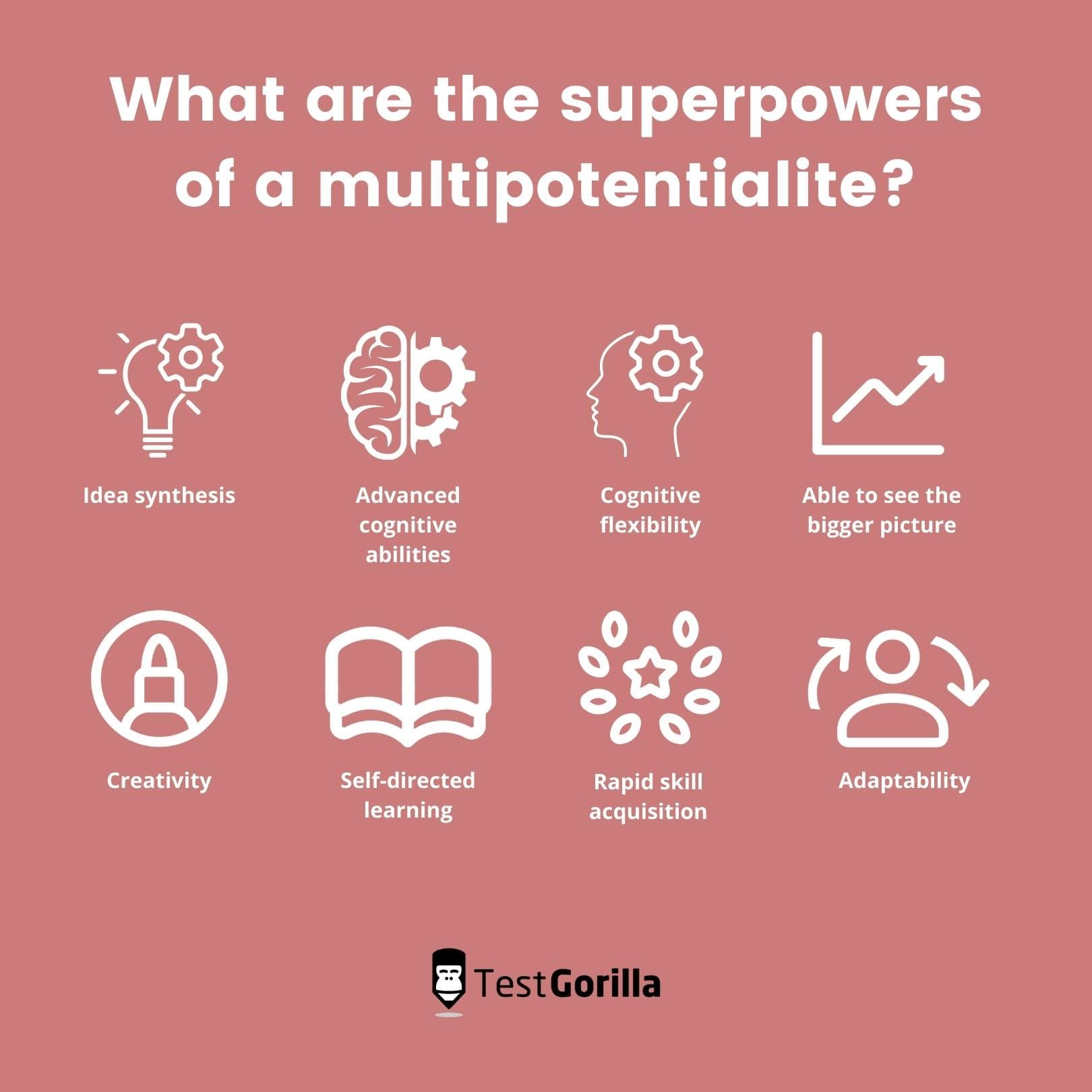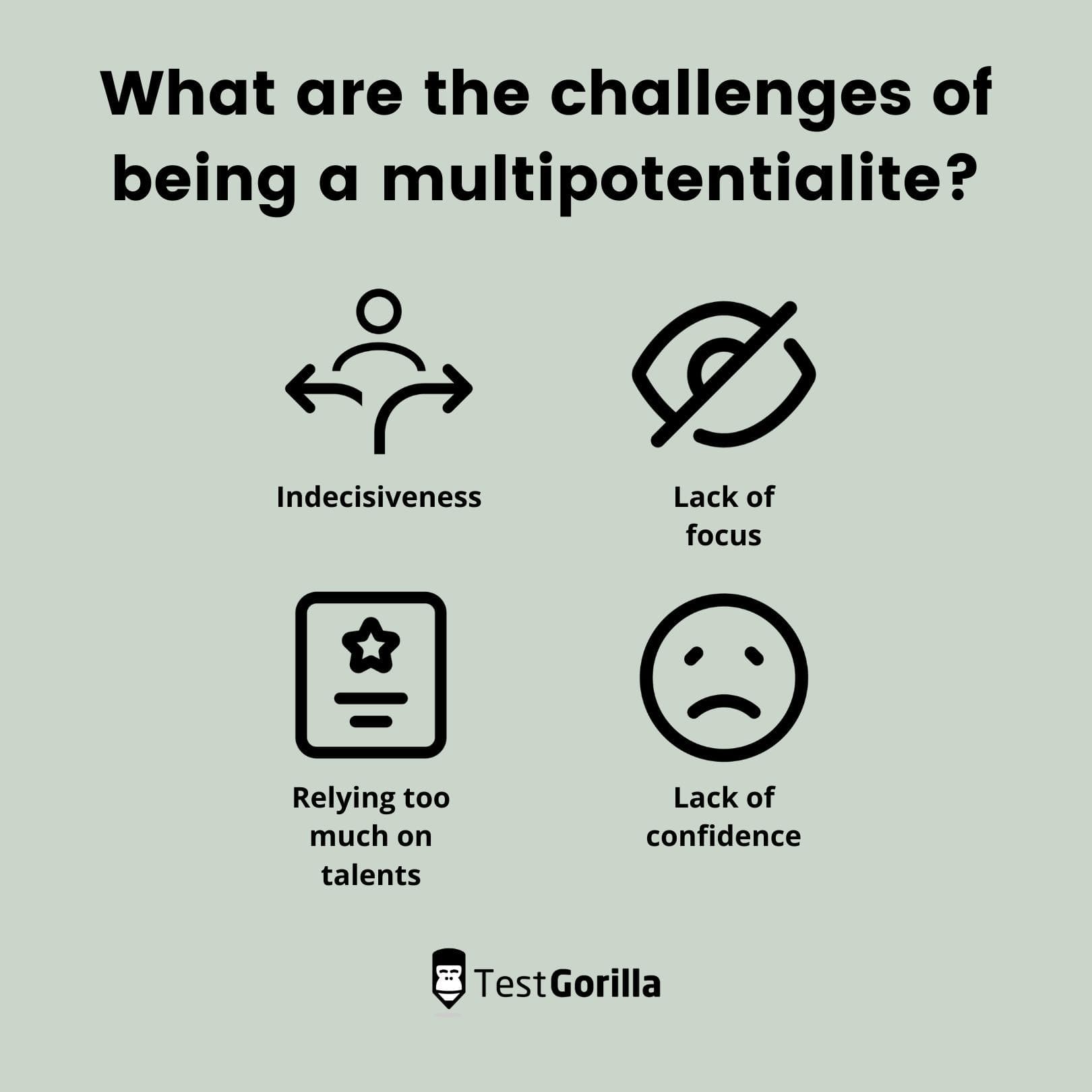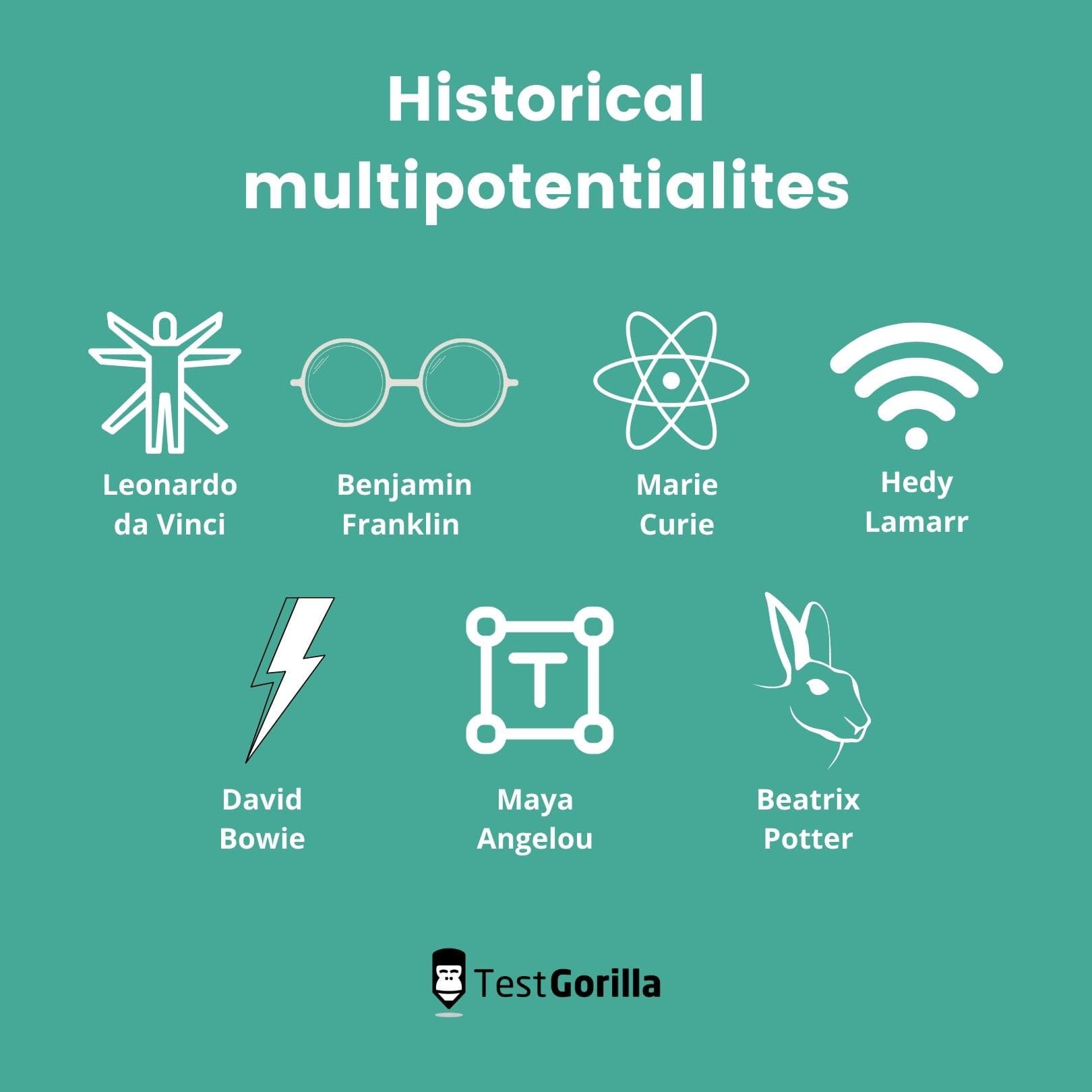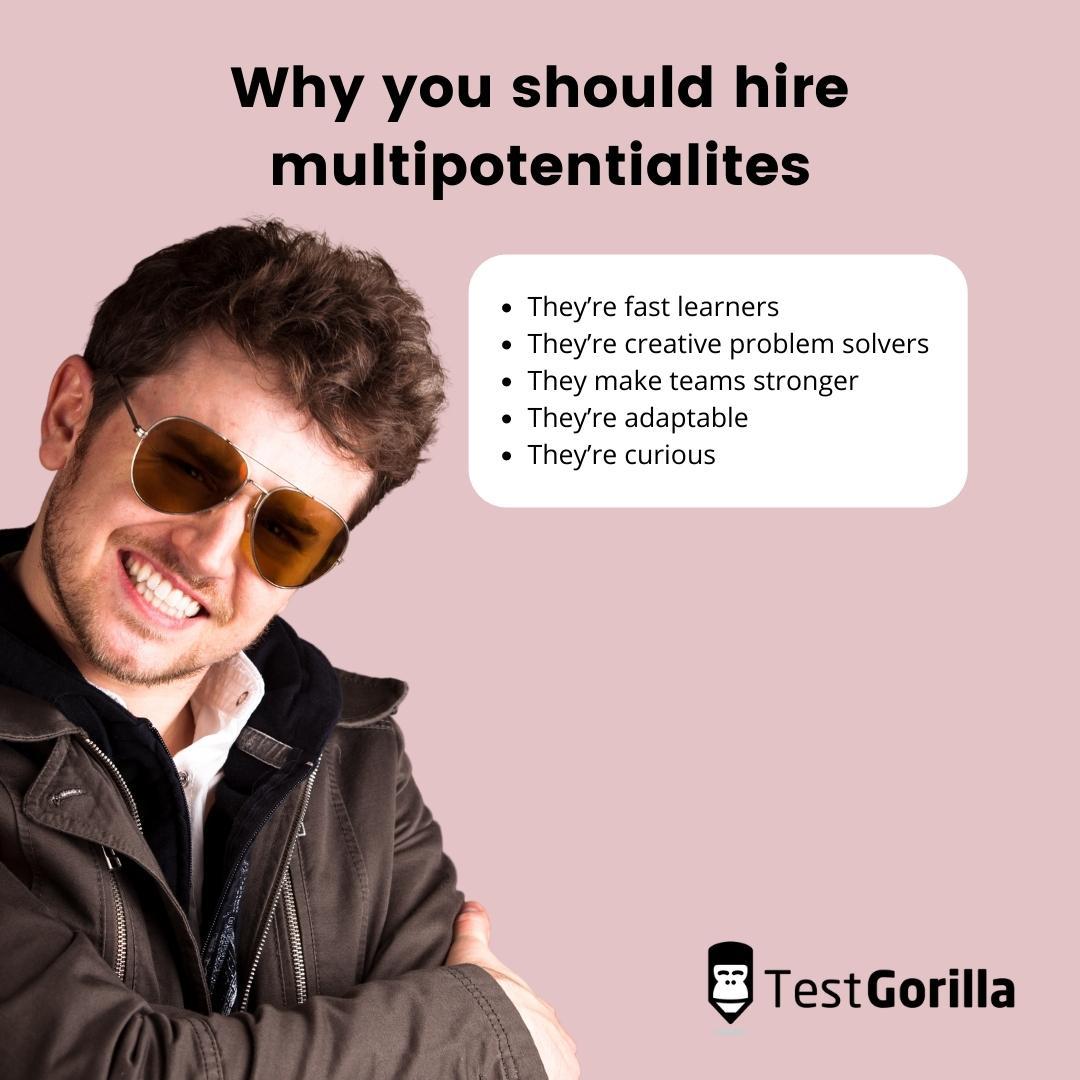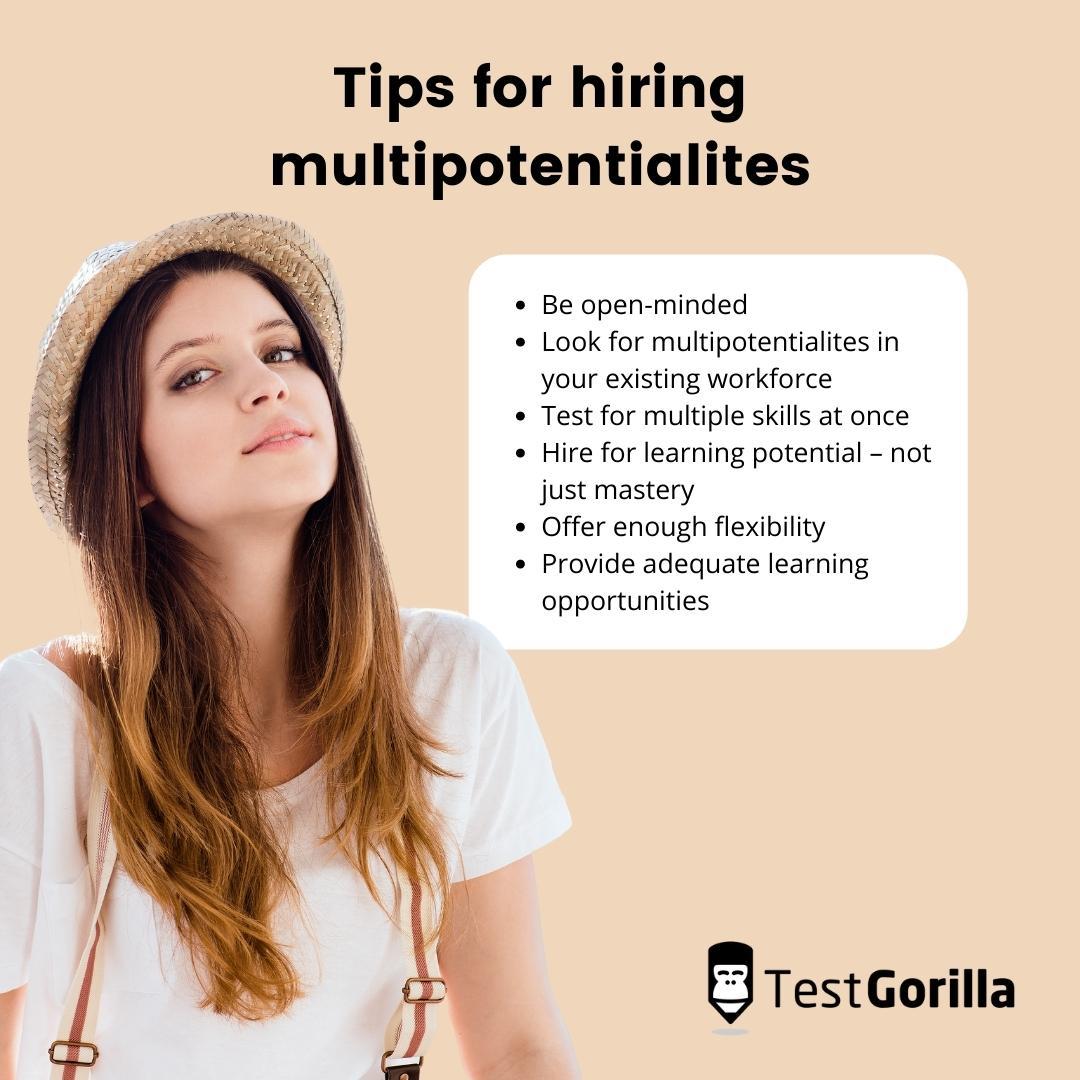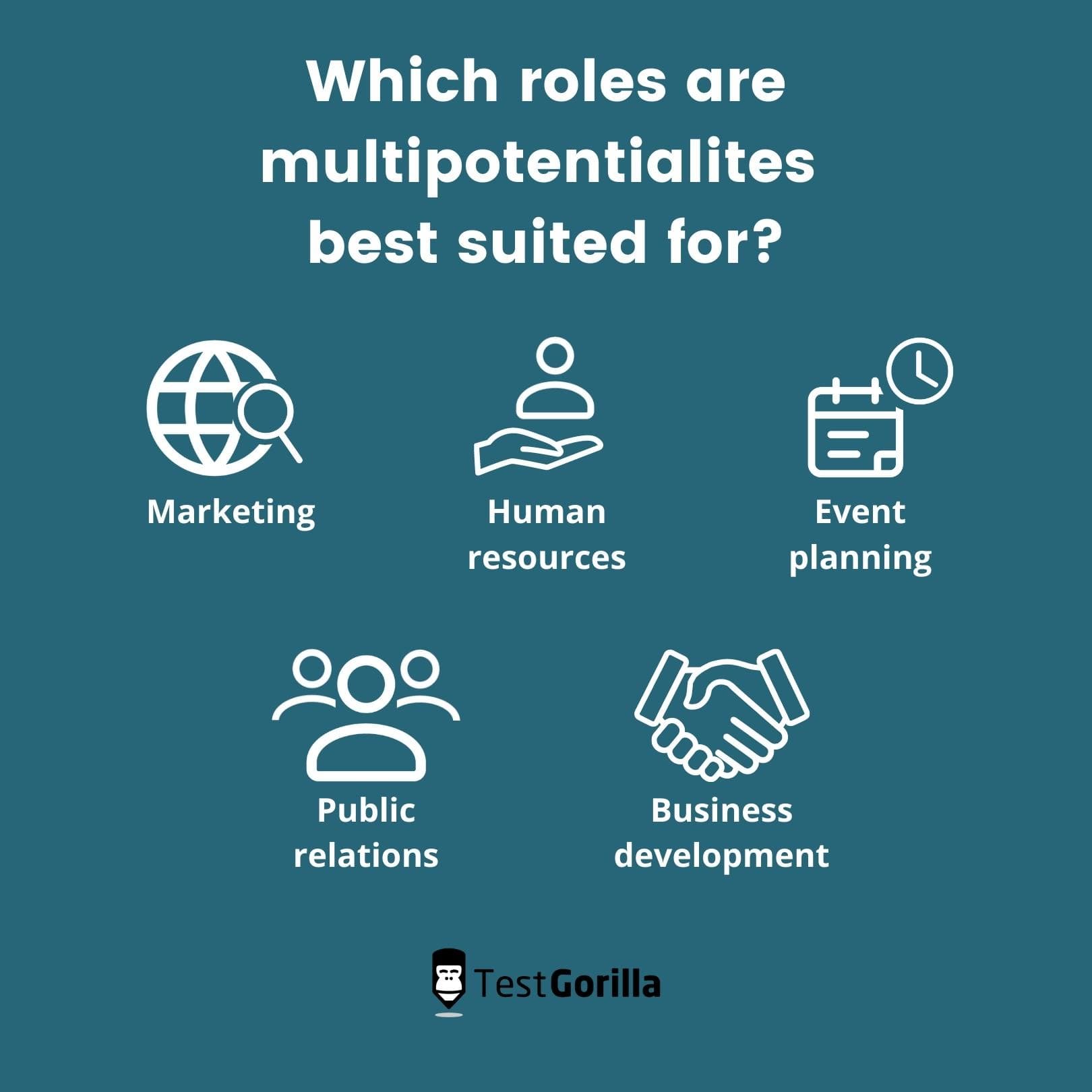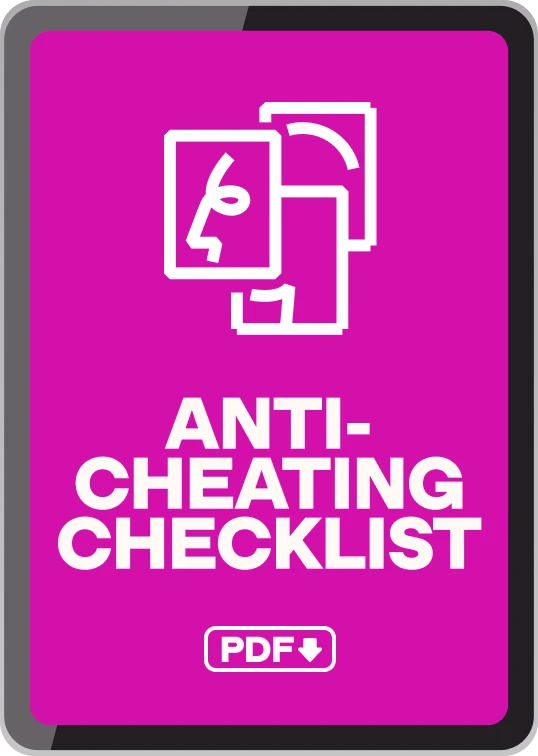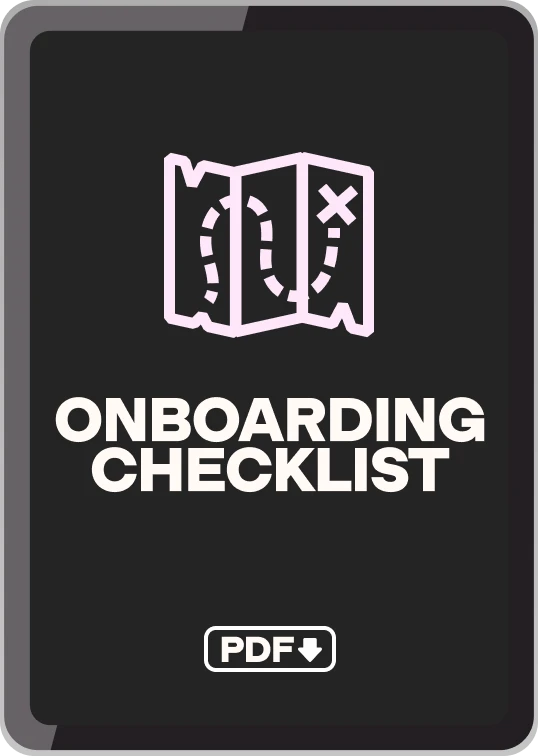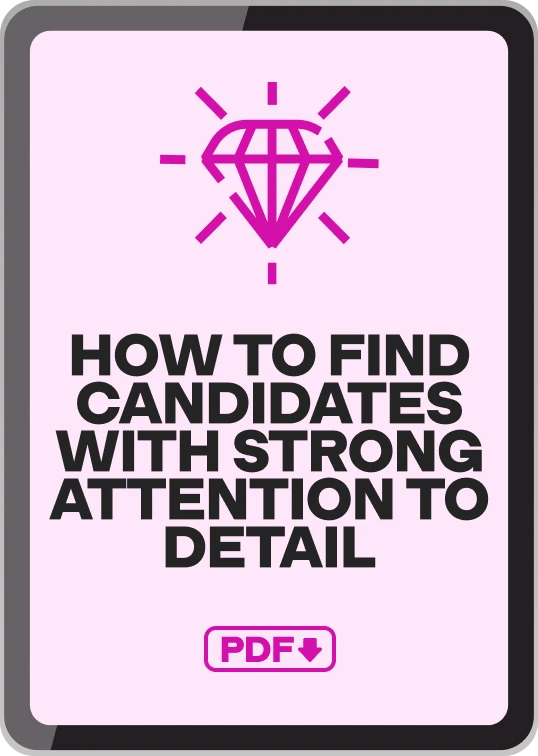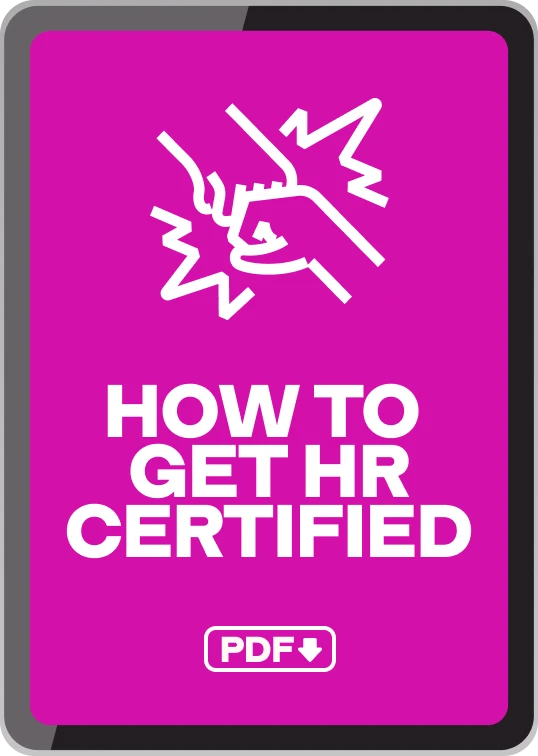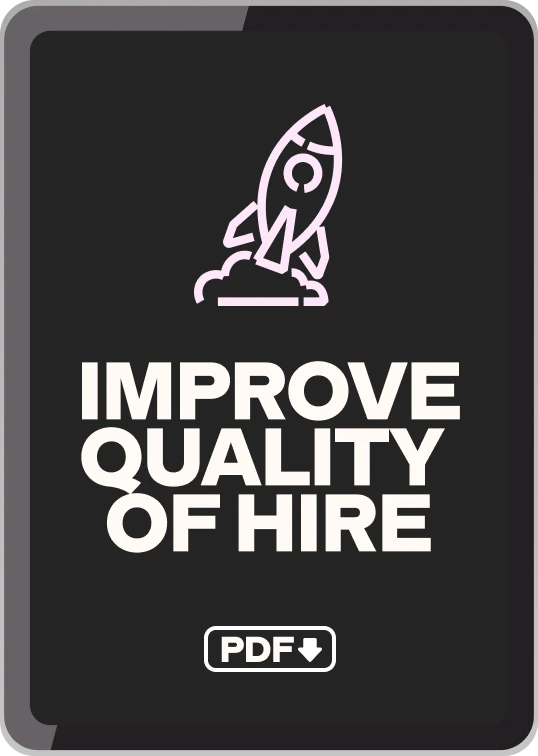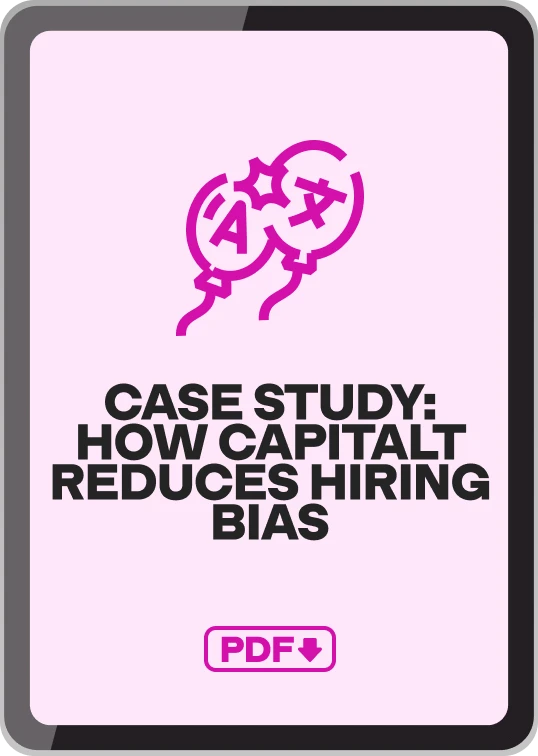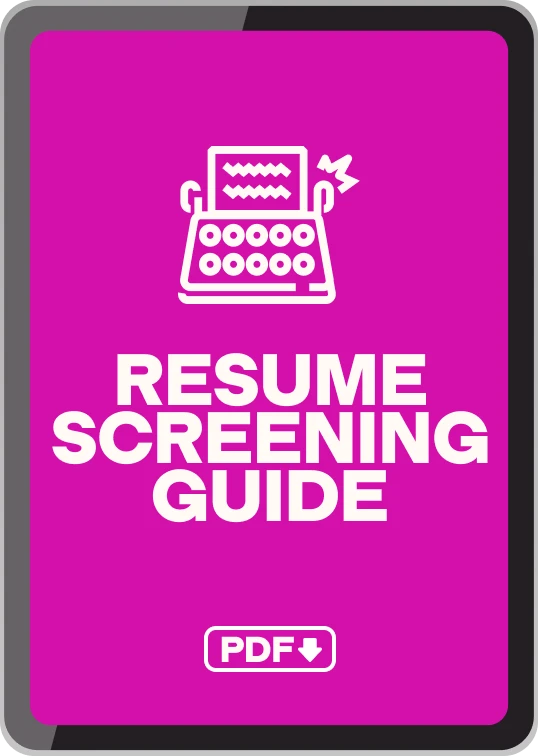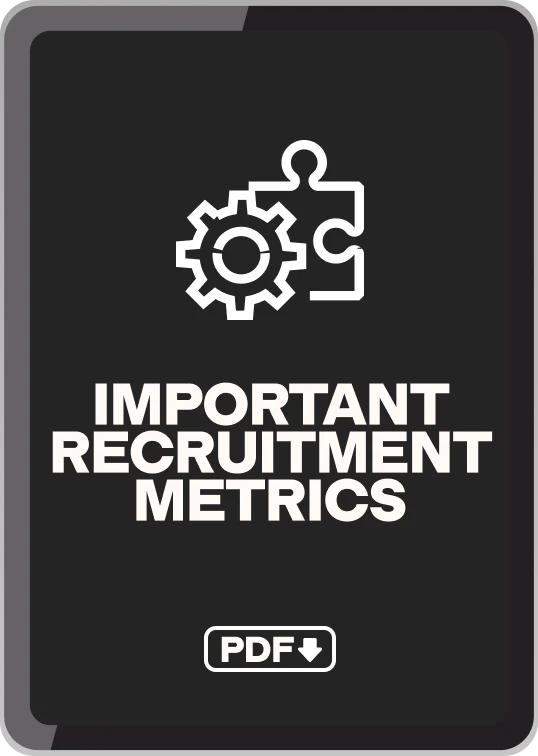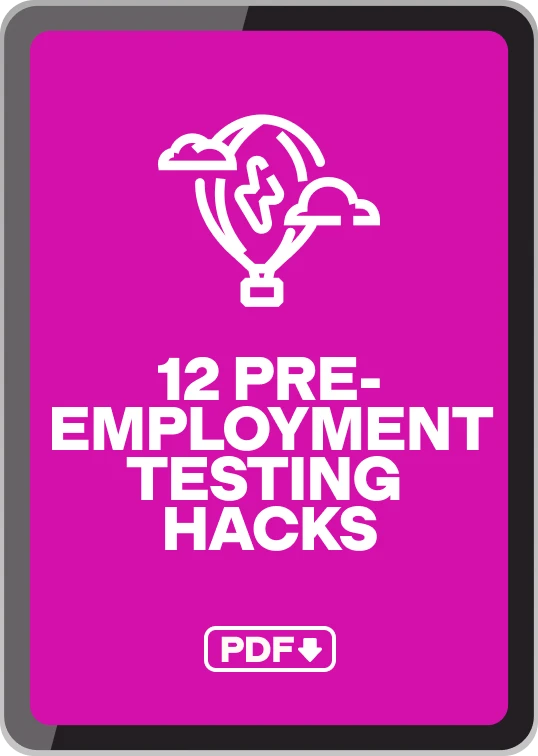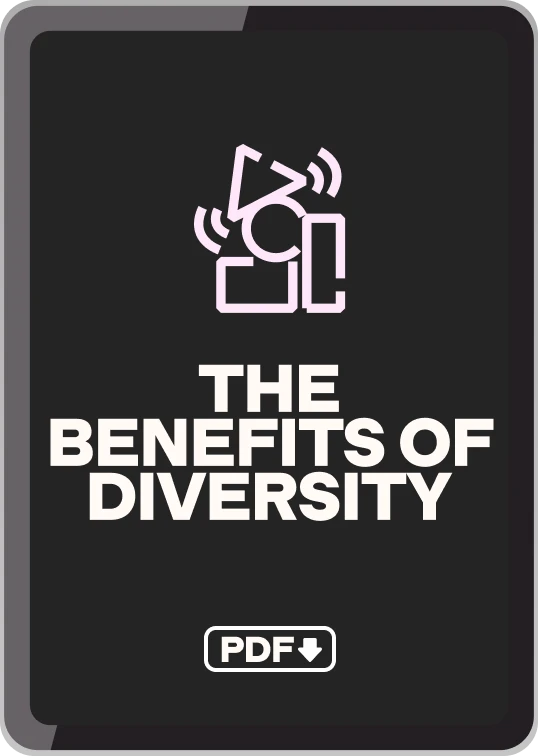Multipotentialites: The future of work
Multipotentialites – people who have exceptional talents in multiple fields and can make a career out of any of them – often have a hard time deciding which path to take.
In today’s workplace, however, having multiple talents and being able to pivot and switch gears is an important quality, making multipotentialites an asset to any organization.
Multipotentialites bring creativity and innovation to the table, helping companies transition and adapt more readily to an ever-changing business environment.
Multipotentialites are becoming an increasingly important part of the workforce as companies begin to realize the importance of cognitive flexibility – which is one of the most important skills for the future, according to the World Economic Forum (WEF).
Multipotentiality and cognitive flexibility are closely linked. Multi-talented people have the ability to use their skills in two or more fields to create a new idea or find a novel solution to a common problem. Similarly, cognitive flexibility enables individuals to switch between different concepts, come up with new approaches or ideas, and quickly adapt to changing environments.
Otherwise said, both cognitive flexibility and multipotentiality are associated with rapid learning and skill acquisition. These can be extremely valuable traits, considering the WEF’s prediction that 50% of the global workforce will need to reskill by 2025.
For all these reasons, organizations are now increasingly seeking to hire creative employees with diverse skill sets. We can even argue that multipotentialites are the future of the workplace because of their ability to work in multiple disciplines and connect the dots between them in unique, creative ways.
Let's dive in.
Table of contents
- Multipotentiality in a nutshell
- Multipotentiality in the workplace
- What are the superpowers of a multipotentialite?
- What are the challenges of being a multipotentialite?
- Multipotentialites vs. polymaths
- Historical multipotentialites
- A jack-of-all-trades is a master of none – but oftentimes better than a master of one
- Why you should hire multipotentialites
- Tips for hiring multipotentialites
- Tips for working with multipotentialites
- Multipotentialites can be an asset to any organization
Multipotentiality in a nutshell
So, what is multipotentiality?
Multipotentiality is a concept that refers to a person’s capacity to excel in different areas, thanks to their multiple talents and skills.
Emilie Wapnick, a TED speaker and author, coined the term multipotentialite to describe people who have multiple talents, interests, and passions and who engage in many different creative pursuits.
Multipotentialites are sometimes referred to as “Renaissance people” or polymaths, although the three terms have slightly different meanings.
In her TED talk, “Why some of us don’t have one true calling,” Emilie discusses multipotentiality in detail. She argues that multipotentialites have multiple strengths, such as idea synthesis, rapid learning, and adaptability.
According to her, multipotentialites can successfully integrate all of their talents to build a dynamic and fulfilling career and can help organizations achieve better results by:
Coming up with novel ideas
Making unusual connections between different domains or disciplines
Acquiring new knowledge and skills easily
Multipotentiality in the workplace
Multipotentialites have a lot to offer and can make great employees. They’re creative, adaptable, innovative, and usually gifted problem solvers.
However, they can sometimes be seen as a liability in the workplace. A multipotentialite may have a hard time sticking to one task or project and can be regarded as indecisive, lacking focus, or a “jack-of-all-trades, master of none.”
Their many passions might be interpreted as a lack of commitment to a single goal.
Despite these challenges, multipotentialites are becoming an increasingly important part of the workforce. Businesses are recognizing the value of their creativity and learning potential and are beginning to hire them in larger numbers.
Being a fast learner is a critical skill in today’s business world.
According to the WEF’s Future of Jobs Report, 50% of the global workforce will need to reskill by 2025. Adaptability might be the most important soft skill today – and the one all employers should be looking for when hiring new employees.
For startups and small businesses, in particular, hiring multipotentialites can be an excellent way to grow. Ideally, a multipotentialite could successfully juggle different projects, responsibilities, and tasks, helping teams tackle diverse challenges.
Multipotentialites’ ability to effortlessly wear many different hats can be an important advantage for lean teams in which everyone needs to take on different responsibilities.
In fact, multipotentialites can be extremely valuable members of any organization, big and small ones alike, but they need to be matched with the right role to make the most of their unique skill sets.
The ideal role should:
Be challenging and dynamic
Require a diverse range of skills
Provide many learning opportunities
Allow for creativity and unconventional solutions
Have a clear structure and deadlines
The last aspect is particularly important because multipotentialites might struggle and become scattered and uninvolved if they don’t have the necessary structure.
What are the superpowers of a multipotentialite?
Multipotentialites have a number of impressive strengths that can help them excel and outperform others. Let’s look into some of them.
1. Idea synthesis
Innovation happens at the intersection between two fields. Multipotentialites have the unique capacity to use their multiple talents, backgrounds, and interests to come up with new ideas and concepts.
2. Advanced cognitive abilities
Multipotentialites have distinctive and varied skill sets and often impressive cognitive abilities. This enables them to solve complex problems with ease by using critical-thinking skills, attention to detail, or numerical reasoning, for example.
3. Cognitive flexibility
Because many multipotentialites have worked in different backgrounds – or at least taken a keen interest in multiple hobbies and personal projects – they’re able to easily switch gears and adapt their behavior and thinking to different situations.
Arguably, cognitive flexibility enables people to be less biased and more creative and resilient in the face of adversity.
4. The ability to see the bigger picture
Multi-talented individuals can understand the broader context of a problem because they can see it from different angles. This enables them to bring new perspectives to the table, use different approaches to common problems, and make unexpected connections between ideas.
5. Creativity
Creativity is another quality that sets multipotentialites apart. They can use their ingenuity and innovation at work to find better ways to do things or experiment with novel, unconventional ideas.
Multipotentialites often have a unique perspective of the world and are not bound by traditional ways of thinking or doing things.
6. Self-directed learning
Multipotentialites have a propensity for self-directed learning – that is, learning for the sake of learning rather than to meet specific requirements or objectives.
They often enjoy picking up skills and knowledge for their own sake, which can make them quick learners in the workplace.
7. Rapid skill acquisition
Because multipotentialites often spend time in the “beginner” phase in different fields, they learn how to learn and enjoy the process of gaining new knowledge and skills.
In other words, they become proficient learners who pick up skills easily and aren’t afraid to step out of their comfort zone and explore new territories.
8. Adaptability
People who have many talents adapt easily to new environments, changes in roles and responsibilities, and different company cultures. They’re flexible and don’t get attached to one way of doing things. This makes them excellent employees who can easily shift gears and pivot when needed.
Thanks to these qualities, multipotentialites often make excellent employees, especially when they also have the right communication skills, perseverance, and discipline.
What are the challenges of being a multipotentialite?
Multipotentiality comes with challenges as well.
To understand the full picture of multipotentialites, we also need to look into the downsides of having diverse talents.
1. Indecisiveness
The number of options available to multipotentialites can make it difficult for them to choose just one. They might struggle with career choices or be unwilling to commit to a single specialization or career path.
Multipotentialites often feel like they don’t have a single true calling. This might feel confusing or even provoke anxiety – especially when they compare themselves with others who have already found their career path or when they try to decide between different careers.
They might also feel stuck, be unable to choose between equally exciting careers, or drift from job to job, never staying long enough to master the necessary skills and deepen their expertise in a single field.
2. Lack of focus
Having multiple talents and interests can be distracting and make it difficult to stick to a single long-term goal or even develop a comprehensive career plan.
According to Emilie Wapnick, many multipotentialites struggle with boredom once they become familiar with a specific field and find it difficult to continue investing time and energy into it. As a result, their productivity and results can suffer.
3. Relying too much on their talents
Multipotentialites can sometimes underestimate the amount of work or effort that goes into a specific project or task.
Thanks to their multiple talents, they might be able to complete tasks at the last minute. If they fail, however, it could affect their self-confidence.
Additionally, the unwillingness of some multipotentialites to commit to a field and put the hard work into developing a specific skill set might play against them.
4. Lack of confidence
Paradoxically, having multiple talents can sometimes lead to a lack of confidence. If multipotentialites jump from one career to another, they might never become highly skilled at something and can come to see their lives as a series of failures.
Additionally, multipotentialites often encounter negative stigma due to their lack of long-term commitment to a single field and can end up interpreting their multiple interests as a weakness rather than a strength.
Multipotentialites vs. polymaths
Multipotentialites and polymaths share some similarities, and these terms are often used interchangeably.
The term multipotentiality is quite new, and it doesn’t yet have a solid definition, so it’s still rather vague.
Polymathy, on the other hand, has been around since the 17th century. Nevertheless, we can still outline some important differences between the two.
Polymaths are rare people who have expertise in multiple fields, whereas multipotentialites typically dabble in many different areas without necessarily developing true expertise in them and can get easily bored or frustrated.
Otherwise said, multipotentialites are potential polymaths and could become masters in a few different areas if they have the necessary discipline and put in the hard work needed to achieve proficiency.
Polymaths have a more focused approach and stick to a few areas in which they become experts. Multipotentialites, on the other hand, tend to jump around from one area to another and can lose focus without the necessary perseverance.
Although multipotentialites are not necessarily experts in all fields that interest them, they have the advantage of being able to quickly pick up new skills if needed. In comparison, polymaths typically face a longer learning curve.
Multipotentialites are more adaptable to change, whereas polymaths tend to be more resistant to it.
Polymaths are generally proficient in two or three areas and are often unwilling to branch out into other fields. Multipotentialites are also less likely to be specialists but are good at picking up skills quickly and adapting to change.
Polymaths usually have a narrower range of interests than multipotentialites.
Multipotentialites are more likely to feel overwhelmed by the number of options available to them, whereas polymaths feel energized by the many possibilities and tend to explore their interests more systematically.
Historical multipotentialites
Throughout history, multipotentialites have made significant contributions in a variety of fields. They can be incredible innovators, creators, or researchers – and sometimes all three or more.
Here are some notable examples:
Leonardo da Vinci
Leonardo da Vinci, perhaps the most famous polymath in history, was a painter, sculptor, architect, engineer, and scientist.
He is considered one of the greatest painters of all time and is the true definition of the term “Renaissance man.”
In his notebooks, he took notes and made drawings that covered a diverse range of subjects, including anatomy, paleontology, astronomy, botany, cartography, and painting.
Benjamin Franklin
Benjamin Franklin, one of the Founding Fathers of the United States, was an American statesman, diplomat, printer, scientist, inventor, and author.
He was one of the most influential figures in American history and was proficient in a variety of disciplines, including science, politics, diplomacy, and writing. Franklin was also a successful businessman.
Marie Curie
Marie Curie was a Polish and French physicist and chemist. She was the first woman to win a Nobel Prize and the only person to win it in two different fields. Curie is best known for her work on radioactivity, which she discovered in 1898.
Hedy Lamarr
Hedy Lamarr was an Austrian-born American actress and inventor.
Together with composer George Antheil, she developed a radio guidance system for torpedoes that used spread-spectrum and frequency-hopping technology to defeat the threat of jamming.
The principles of Lamarr and Antheil’s work are still used today in Bluetooth and GPS technology.
David Bowie
David Bowie was an English singer, songwriter, actor, and record producer who was considered one of the most influential musicians of the 20th century. He was known for his unique style and genre-defying music, which included rock, pop, soul, and electronic.
Maya Angelou
Maya Angelou was an American author, poet, and civil rights activist who wrote seven autobiographies, as well as many plays, movies, and television shows. She was also a successful actress, performer, and dancer.
Beatrix Potter
Helen Beatrix Potter, best known for her children’s book The Tale of Peter Rabbit, was an English writer, natural scientist, illustrator, and conservationist.
Of course, these are just a few examples – there have been many more multipotentialites and polymaths throughout human history, many of them becoming famous for their achievements in a few different fields.
A jack-of-all-trades is a master of none – but oftentimes better than a master of one
A multipotentialite might be seen as a “jack-of-all-trades” or a generalist (as opposed to a specialist), which is sometimes considered a liability.
Skillful generalists, however, can help organizations drive innovation and growth and achieve important objectives, thanks to their ability to wear many different hats.
As the saying goes, they are “oftentimes better than a master of one.” (This part of the saying may have been added in the 21st century, according to Wikipedia.)
According to Jake Chapman, a managing partner at Alpha Bridge Partners, as distinctions between industries and fields are breaking down, the most important growth opportunities nowadays lie at the intersection of different domains.
In the era of technical convergence, he argues, well-rounded generalists might be among the most valuable workers at an organization.
As fields are converging and new fields are born, it’s precisely the jacks-of-all-trades that can help others navigate change. They can see patterns, connections, and interdependencies that specialists might miss.
A person who’s able to adapt to change and reskill might be better suited to today’s business world and can help their organization survive and thrive.
The companies that can reskill their workforce are the ones that will be able to adapt to the rapid evolution of technology and business models and close skills gaps.
According to McKinsey & Company, two-thirds of companies are currently trying to address skills gaps through hiring, and 56% are looking to help their employees build new skills.
These two approaches are related. Hiring a more adaptable workforce that can pick up skills easily helps lay the groundwork for upskilling employees at a later stage through a comprehensive learning and development strategy.
Why you should hire multipotentialites
There are multiple reasons you might want to hire multipotentialites at your company and not just specialists who have exceptional knowledge in one particular topic.
We already discussed some of these reasons in the previous sections, so here we’ll provide you with a quick recap.
1. They’re fast learners
Multipotentialites can learn skills quickly and effectively because they have a diverse range of knowledge and experiences and are used to acquiring new skills.
2. They’re creative problem solvers
Multipotentialites are often creative thinkers who can come up with innovative solutions to problems because they look at them from different perspectives. Their exceptional problem-solving skills can help you crack tough challenges and achieve important objectives.
3. They make teams stronger
Multipotentialites are often open-minded and tolerant people with a global perspective, which can be extremely valuable if you’re aiming to build a diverse workforce.
And you should because the case for diversity is stronger than ever.
According to McKinsey & Company, diverse companies are systematically achieving better financial results than less diverse organizations.
Multipotentialites can help you create an inclusive workplace and build unexpected connections between people.
They make teams stronger because they can naturally understand and reconcile conflicting viewpoints, work with specialists from different backgrounds, and improve communication within and between teams.
4. They’re adaptable
Multipotentialites are used to change and are often highly adaptable, which is an important trait in today’s rapidly changing world.
They are comfortable working in ambiguous and uncertain environments. When the landscape of a particular field changes, they’re able to pivot easily and continue providing value.
5. They’re curious
Thanks to their many interests, multipotentialites are naturally curious and well versed in multiple fields. This curiosity often leads multipotentialites to explore new domains, which can help organizations innovate and achieve their goals.
Tips for hiring multipotentialites
One of the best ways to hire top talent is to be open to hiring for skills and learning potential rather than just for degrees or specialization in a single domain.
If you’re looking to source and recruit multipotentialites for your company, there are a few things you can do.
1. Be open-minded
First, be open-minded about multipotentialites and their strengths.
Don’t limit yourself to thinking that all employees you hire can and should be successful in one field. Instead, recognize and acknowledge multi-talented individuals for their ability to do well in multiple areas, even if they don’t fit neatly into a well-defined, highly specialized role.
2. Look for multipotentialites in your existing workforce
Second, look for multipotentialites among your current employees. Many might already be working at your company without you realizing it.
If you have an existing talent-mapping strategy in place, you’ll be able to identify multipotentialites easily. But even if you don’t, look for employees who have many different interests, diverse experiences, or exceptional talents.
They might be the “Renaissance people” your organization needs to drive innovation and tackle tough challenges.
If you identify a multipotentialite, make sure they have the right conditions to thrive in their role, such as a challenging and dynamic environment, adequate learning opportunities, and chances to be creative and flexible in their day-to-day tasks.
3. Test for multiple skills at once
When hiring for a role that requires a skilled generalist, you need to test for multiple skills at once.
You can do that easily with TestGorilla’s skills assessments, in which you can combine up to five skills tests from different categories, such as:
Instead of concentrating on diplomas and qualifications, use a skills-based hiring approach.
Degrees don’t tell the full story, especially about multipotentialites, who have a multitude of interests but might not have pursued each one professionally or gained a certification.
That being said, it might still be useful to take a deeper look at your candidates’ CVs if you’re trying to find multipotentialites. A person who has diverse experience and an atypical career path might be the multipotentialite you’re looking for.
4. Hire for learning potential – not just mastery
If you test for cognitive ability, you can find individuals who have broad skills, such as problem solving, critical thinking, attention to detail, and verbal reasoning, which they can use to excel in different roles.
You can train employees on the specific skills required for a role, but it’s much more difficult to develop their innate curiosity and creativity.
5. Offer enough flexibility
To recruit multipotentialites, you need to offer enough flexibility in the role you’re hiring for.
In your job ad:
Outline the different types of tasks they’ll be working on and the teams and people they’ll be interacting with
Be clear that you’re looking for someone who can embrace multiple disciplines
State that there’s a lot of room for creativity and innovation in this role
Additionally, you should encourage people from different professional backgrounds to apply.
6. Provide adequate learning opportunities
Multipotentialites are quick learners and love exploring new fields, so make sure you provide adequate learning and development opportunities for them. This can include on-the-job training, online courses, certifications, mentorship programs, and more.
Tips for working with multipotentialites
Multipotentialites thrive in workplaces where they can use their diverse skills and interests to achieve success and where they’re appreciated for the many hats they’re able to wear.
This means you need to give multipotentialites the opportunity to dabble in different areas, take on new challenges, and work with people from different backgrounds.
Let them experiment and use new approaches to problems, and provide them with adequate guidance if you notice they’re getting lost.
If multipotentialites feel like they’re stuck in a rut or that their job isn’t challenging enough, they might become demotivated and eventually look for other opportunities.
How multipotentialites and hiring managers can work together
So, how can multipotentialites and hiring managers work together to find the best role for multipotentialites in an organization?
Hiring managers should:
Accurately assess multipotentialites’ skills, learning potential, and motivation. Multipotentialites are more likely than other employees to be adaptable and able to learn skills quickly.
Try to identify multipotentialites’ natural strengths and weaknesses, and put them in roles that enable them to make the most of their unique talents.
Give multipotentialites clear goals and tasks with well-defined timelines and deadlines so that they can focus on a single task at a time and achieve results.
Multipotentialites should:
Be honest with themselves about the things they’re good at and be willing to put in the hard work to develop their skills.
Take advantage of the proposed learning opportunities to pick up new skills and improve their knowledge in specific areas.
Acknowledge that they won’t always be able to pursue new interests: Sometimes, they’ll need to concentrate on a single subject and simply put in the work needed to achieve mastery.
Which roles are multipotentialites best suited for?
Multipotentialites are particularly well suited for roles that require strong generalist skills, such as:
Marketing: marketing manager, marketing assistant, communications manager, creative director
Human resources: HR assistant, HR manager, HR co-ordinator, recruiter
Event planning: event planner, event co-ordinator
Public relations: PR manager, media co-ordinator, communications manager
Business development: business development manager, partnerships manager
Hiring managers should also consider multipotentialites for roles that require creativity and innovation, such as those in research and development, product management, data science, and software engineering.
Multipotentialites can be an asset to any organization
Multipotentialites can be an asset to any organization and help it achieve its goals by bringing their diverse skills, passions, and interests to the table.
Hiring managers should be aware of multipotentialites’ strengths and weaknesses and put them in roles in which they can make the most of their unique abilities.
When looking to hire multi-talented individuals, you need to test for both skills and potential and be willing to provide the necessary learning opportunities.
Hiring managers can work together with multipotentialites to find the most suitable role for them in the organization and achieve impressive results.
With TestGorilla, you’ll find the process to be simpler, faster, and much more effective. Get started for free today and find multipotentialites to join your team.
Related posts
You've scrolled this far
Why not try TestGorilla for free, and see what happens when you put skills first.
Latest posts
The best advice on pre-employment testing, in your inbox.
No spam. Unsubscribe at any time.

Hire the best. No bias. No stress.
Our screening tests identify the best candidates and make your hiring decisions faster, easier, and bias-free.
Free resources
This checklist covers key features you should look for when choosing a skills testing platform
This resource will help you develop an onboarding checklist for new hires.
How to assess your candidates' attention to detail.
Learn how to get human resources certified through HRCI or SHRM.
Learn how you can improve the level of talent at your company.
Learn how CapitalT reduced hiring bias with online skills assessments.
Learn how to make the resume process more efficient and more effective.
Improve your hiring strategy with these 7 critical recruitment metrics.
Learn how Sukhi decreased time spent reviewing resumes by 83%!
Hire more efficiently with these hacks that 99% of recruiters aren't using.
Make a business case for diversity and inclusion initiatives with this data.

